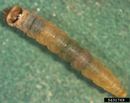Journal of Pest Science (2019) 92, 1359-1370
From Pestinfo-Wiki
 | Selected publication you are invited to contribute to the discussion section (above tab) |
Bottom-up effects of irrigation, fertilization and plant resistance on Tuta absoluta: implications for Integrated Pest Management
Journal of Pest Science 92 (4), 1359-1370
Abstract: Soil abiotic factors and plant traits are able to trigger bottom-up effects along the tri-trophic plant–herbivore–natural enemy interactions. The consequences could be useful for controlling the insect herbivores. The South American tomato pinworm, Tuta absoluta Meyrick (Lepidoptera: Gelechiidae), a devastating invasive leaf-mining pest on tomato and other solanaceous plants, is currently threatening the tomato production worldwide. Recent knowledge of bottom-up effects on this pest has been gained, with fertilization, irrigation, plant resistance traits, as well as their interactions, being the major sources of these effects. Evidence is now emerging on how they impact on the performance of the moth from the perspective of tri-trophic interactions. In this review, we summarize the essential experiments studying the bottom-up effects on T. absoluta and discuss the implications of those findings for the Integrated Pest Management programs. Future promising research directions are then proposed.
(The abstract is excluded from the Creative Commons licence and has been copied with permission by the publisher.)
Full text of article
Research topic(s) for pests/diseases/weeds:
biocontrol - natural enemies
resistance/tolerance/defence of host
Research topic(s) for beneficials or antagonists:
environment/habitat manipulation
Pest and/or beneficial records:
| Beneficial | Pest/Disease/Weed | Crop/Product | Country | Quarant. |
|---|---|---|---|---|
| Phthorimaea absoluta | ||||
| Macrolophus pygmaeus (predator) | Phthorimaea absoluta | |||
| Necremnus tutae (parasitoid) | Phthorimaea absoluta |